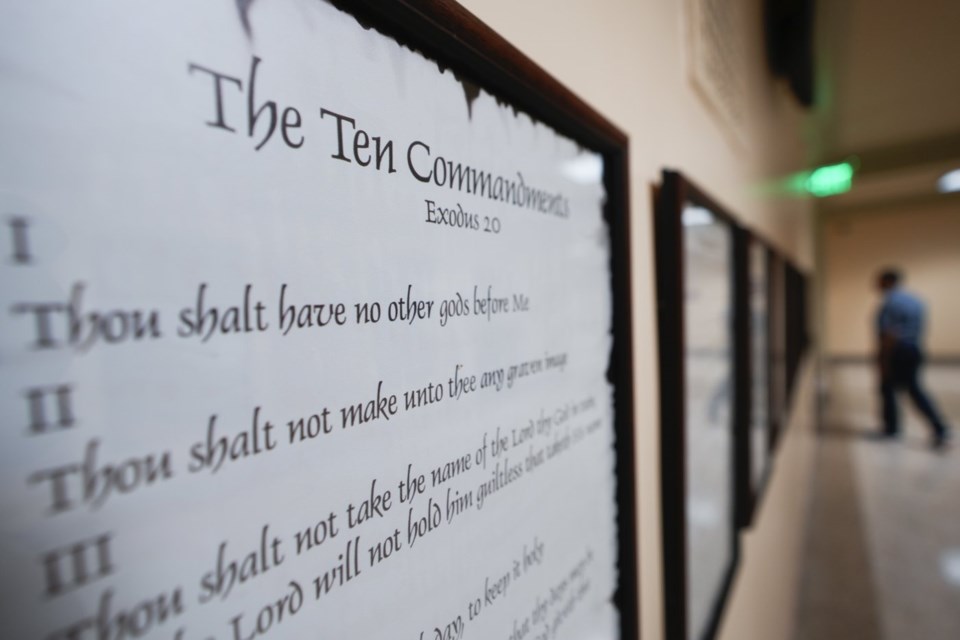NEW ORLEANS (AP) ‚ÄĒ A panel of three federal appellate judges has ruled that a Louisiana law requiring the Ten Commandments in each of the state‚Äôs public school classrooms is unconstitutional.
The ruling Friday marked a major win for civil liberties groups who say the mandate violates the separation of church and state, and that the poster-sized displays would isolate students ‚ÄĒ especially those who are not Christian.
The mandate has been touted by Republicans, including President Donald Trump, and marks one of the latest pushes by conservatives to . Backers of the law argue the Ten Commandments belong in classrooms because they are historical and part of the foundation of U.S. law.
‚ÄúThis is a resounding victory for the separation of church and state and public education,‚ÄĚ said Heather L. Weaver, a senior staff attorney with the American Civil Liberties Union. ‚ÄúWith today‚Äôs ruling, the Fifth Circuit has held Louisiana accountable to a core constitutional promise: Public schools are not Sunday schools, and they must welcome all students, regardless of faith.‚ÄĚ
The plaintiffs’ attorneys and Louisiana disagreed on whether the appeals court’s decision applied to every public school district in the state or only the districts party to the lawsuit.
‚ÄúAll school districts in the state are bound to comply with the U.S. Constitution,‚ÄĚ said Liz Hayes, a spokesperson for Americans United for Separation of Church and State, which served as co-counsel for the plaintiffs.
The appeals court's rulings ‚Äúinterpret the law for all of Louisiana,‚ÄĚ Hayes added. "Thus, all school districts must abide by this decision and should not post the Ten Commandments in their classrooms.‚ÄĚ
Louisiana Attorney General Liz Murrill said she disagreed and believed the ruling only applied to school districts in the five parishes that were party to the lawsuit. Murrill added that she would appeal the ruling, including taking it to the U.S. Supreme Court if necessary.
The panel of judges reviewing the case was unusually liberal for the 5th U.S. Circuit Court of Appeals. In a court with more than twice as many Republican-appointed judges, two of the three judges involved in the ruling were appointed by Democratic presidents.
The court's ruling stems from last year by parents of Louisiana school children from various religious backgrounds, who said the law violates First Amendment language guaranteeing religious liberty and forbidding government establishment of religion.
The ruling also backs an order issued last fall by U.S. District Judge John deGravelles, who declared the mandate unconstitutional and ordered state education officials not to enforce it and to notify all local school boards in the state of his decision.
Republican Gov. Jeff Landry into law last June.
Landry said in a statement Friday that he supports the attorney general's plans to appeal.
‚ÄúThe Ten Commandments are the foundation of our laws ‚ÄĒ serving both an educational and historical purpose in our classrooms,‚ÄĚ Landry said.
Law experts have long said they expect the Louisiana case to make its way to the U.S. Supreme Court, testing the court on the issue of religion and government.
Similar laws have been challenged in court.
A group of Arkansas families filed a earlier this month challenging a near-identical law passed in their state. And comparable legislation in Texas currently awaits Gov. Greg Abbott's signature.
In 1980, the that a Kentucky law violated the Establishment Clause of the U.S. Constitution, which says Congress can ‚Äúmake no law respecting an establishment of religion.‚ÄĚ The court found that the law had no secular purpose but served a plainly religious purpose.
And in 2005, the Supreme Court held that such displays in a pair of Kentucky courthouses violated the Constitution. At the same time, the court upheld a Ten Commandments marker on the grounds of the Texas state Capitol in Austin.
Sara Cline And Jack Brook (), The Associated Press



